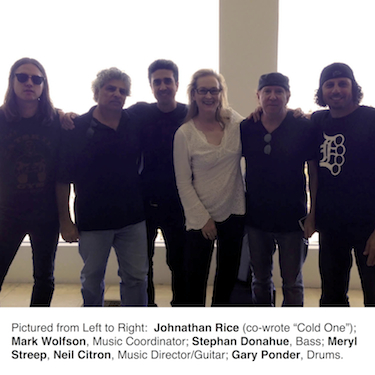|

SAFETY HARBOR, FLORIDA: Led by three-time Academy Award-winning actress Meryl Streep, Ricki and the Flash is the tale of an aging rocker coming to terms with the family she left behind decades prior to pursue a life of music. Guitar virtuoso and guitar instructor to the stars Neil Citron joined the casting team early in the film’s development to help select the actors who would play Streep’s band mates. One thing led to another, which led to another, which led to another, and Citron – also an accomplished producer and engineer – eventually found himself editing and mixing all of the film’s live music, both for the movie itself and for the soundtrack. As has been his protocol since he first acquired his Metric Halo ULN-2 converter/interface twelve years ago, Citron relied on Metric Halo’s musical, well-balanced conversion technology to give Ricki and the Flash its authentic, bar room sound.
“When we were in auditions, I saw Meryl doing some things on guitar that were inconsistent with the idea that she was a old veteran rocker,” Citron explained. “Her guitar instructor had done a marvelous job, but he kind of taught her ‘proper Spanish,’ whereas she needed some ‘street Spanish’ to make her performance more natural and believable. I showed her all the short-cuts veteran guitarists use, along with the more nuanced techniques of muting un-played strings. Another good analogy would be driving school; when I first saw Meryl at the auditions, she had her hands at 10 o’clock and 2 o’clock. But what experienced driver actually drives like that?”
Unlike the filming of most music scenes in most movies, where the actors mime along to playback of the actual audio track, director Jonathan Demme wanted the musicians to actually play in Ricki and the Flash. Moreover, he wanted to use the recording of their filmed performance in the movie. Together with long-time collaborator Mark Wolfson, Citron recorded all of the live music scenes for the movie. “It was a fun movie to work on, because everyone kept asking, ‘is this how they’d really do it in a real bar?’” said Citron, who was able to draw on his long tenure in the Gazzarri’s house band to recommend elements of realism. “They really cared. We set everything up exactly as you would in a small bar.” The film’s daily editors asked Citron and Wolfson for rough mixes, which would be a lot more inspiring and easy to work with than, say, a single mic back on a camera somewhere. Everyone loved those rough mixes, which earned Citron and Wolfson the final mixing gig.
After filming completed, Citron settled in back at his home studio with his trusty Metric Halo ULN-2. “I’ve been using the converters in my ULN-2 since it first came out, twelve years ago,” he said. “They have an open top end that isn’t at all harsh or painful. It’s pleasant and natural. The low end is extended and clear. In all, the ULN-2’s sound is very well balanced and allows me to hear what’s actually happening inside my mix. A few years ago, Metric Halo serviced my ULN-2. The turnaround was quick – just one week, but I had to find a replacement to keep moving forward on my projects. In comparison, the substitute – which is well-regarded in the industry – had an unpleasing, digital-sounding high end, a narrower image, and a bottom end that seemed to hide things.”
He continued, “I’m of the opinion that most people are mixing with far more bias in their converters than they realize, which leads them to overcompensate. Then when their mix gets played back on another system, it sounds unbalanced in the opposite direction.” Citron relies on the ULN-2 for conversion of his dry mix, which constitutes 90% of the final mix. He sums it with returns from an array of outboard reverbs and delays. The mix for Ricki and the Flash followed that same tested path and helped produce a final cinematic experience that has been praised for the realism of its bar room scenes. |